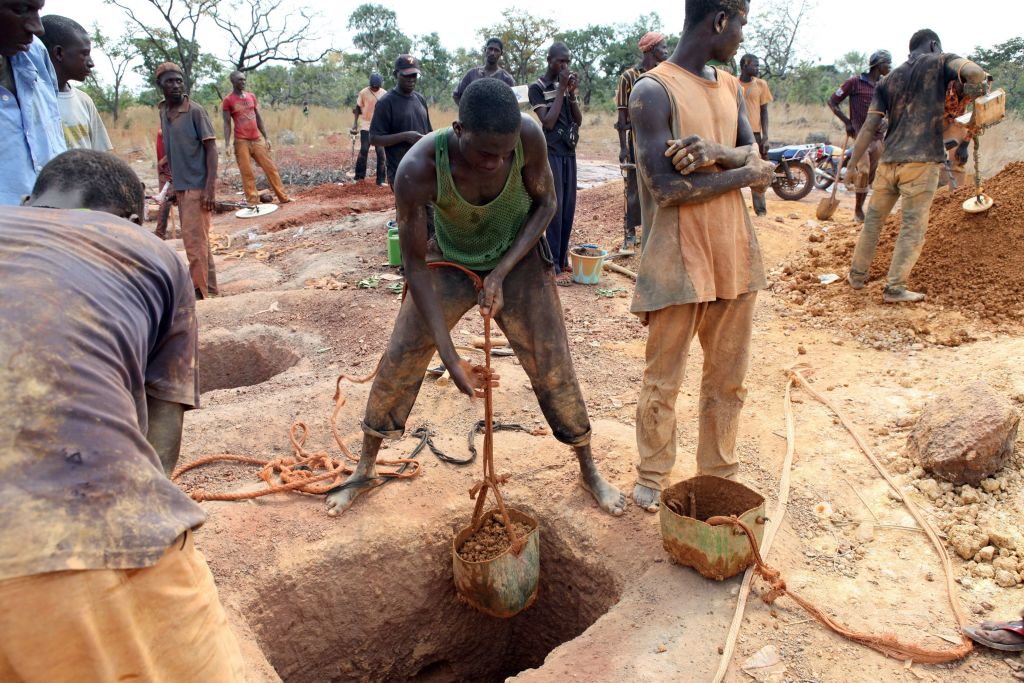Russia Tightens Control of Malian Gold
ADF STAFF
Since the notorious Russian mercenary outfit formerly known as the Wagner Group began reorganizing under the control of the Russian Defense Ministry in 2023, controlling gold mining sites in Mali has been a priority.
Russian mercenaries arrived by helicopter near the rural village of Intahaka in the Gao region on February 9 and seized Mali’s largest artisanal gold mine. With the help of the Malian military, the mercenaries secured the site by forcing out a Tuareg rebel group.
Control of the sprawling site, which can accommodate as many as 4,000 miners, has changed hands several times in recent years, as violent extremists associated with al-Qaida and the Islamic State group have fought civilians, government forces and each other for a share of the spoils.
Now in charge are the Russian mercenaries who call themselves the Africa Corps. Their partnership with the Malian military junta leaders was forged in late 2021, purportedly to fight the extremist groups occupying large swaths of land and terrorizing civilians.
“Wagner’s men controlled access to the mine for a time,” a Malian source told the Africa Report magazine. “They charged an entrance fee to people coming to extract the gold.”
Gold is Mali’s most important commodity, dominating total exports. Mali has become Africa’s third-largest gold producer and 13th-largest in the world.
The Ministry of Mines has estimated that Mali has 881 metric tons in gold deposits in about 300 artisanal mining sites. It also estimates that 2 million gold miners, more than 10% of the population, depend on the industry for their livelihoods.
Concerned about sovereignty, junta leaders reportedly had been wary of handing over mining concessions to the mercenary group but faced significant financial difficulty because of the impact of regional sanctions imposed after the last coup in 2021.
As of February 2024, the presence of Russian mercenaries in Mali had declined to about 1,000 men from a high of 2,000. The monthly payment remains close to $10.8 million per month but part of that could be paid in gold.
Early in 2023 Wagner Group mercenaries took over at least three mines south of Mali’s capital, Bamako: Balandougou, about 20 kilometers from the border with Guinea; Koyoko, a nearby gold-panning site in the Kangaba Cercle; and a third site near Yanfolila.
The ruling military junta overhauled Mali’s mining laws in August 2023, increasing its stake of mining projects from 20% to 35% and abolishing previously issued tax exemptions. It also created a mining exploration and research company to audit the sector.
Experts say Mali’s most productive gold mines — Loulo and Gounkoto, run by Canada’s Barrick Gold — are in Russia’s crosshairs. In 2022 the two mines produced 19.4 tons of gold, nearly a third of the country’s 66-ton production.
“The authorities want to expropriate Barrick Gold, but without doing so too openly,” a Malian source close to the discussions told The Africa Report magazine.
“After the sector audit report was submitted last August, the finance minister wrote to all the mining companies operating in Mali to renegotiate their operating contracts. But this is just window-dressing. Their real target is Barrick.”
Several Malian sources told the magazine that significant negotiations are underway in Bamako with the intention of removing Barrick Gold from the Loulo and Gounkoto sites.
Since its invasion of Ukraine in 2022, Russia has made more than $2.5 billion from trade in African gold, according to the Blood Gold Report, published in December 2023.
Jack Watling, a land warfare specialist with the Royal United Services Institute, believes mining is just one piece of Russia’s blueprint for profiting in Africa. The country follows a pattern of stoking insecurity, posing as a security solution and extracting mineral wealth as payment.
“There is a standard Russian modus operandi, which is that you cover the operational costs with parallel business activity,” he told the BBC. “In Africa, that is primarily through mining concessions.
“The Russian approach, which is to isolate these regimes, capture their elites and to extract their natural resources, is quite colonial.”


Comments are closed.